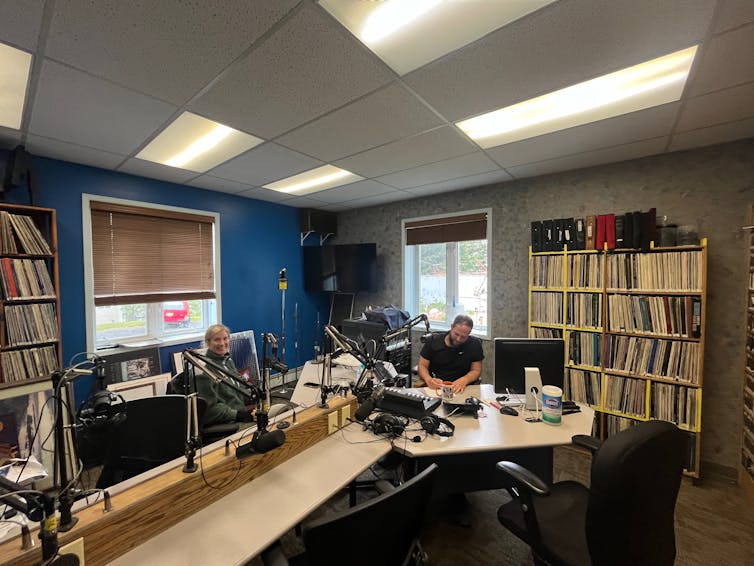Champions of the just about solely party-line vote within the U.S. Senate to erase US$1.1 billion in already permitted funds for the Company for Public Broadcasting known as their motion a refusal to subsidize liberal media.
“Public broadcasting has long been overtaken by partisan activists,” mentioned U.S. Sen. Ted Cruz of Texas, insisting there isn’t any want for presidency to fund what he regards as biased media. “If you want to watch the left-wing propaganda, turn on MSNBC,” Cruz mentioned.
However these prices of bias hardly ever survive empirical scrutiny.
That independence in the US – enshrined within the press freedom clause of the First Modification – provides journalists the flexibility to carry authorities accountable, expose abuses of energy and thereby help democracy.
GOP Sen. Ted Cruz speaks to reporters as Senate Republicans vote on President Donald Trump’s request to cancel about $9 billion in international assist and public broadcasting spending on July 16, 2025.
AP Photograph/J. Scott Applewhite
Trusting independence
A 2020 peer-reviewed research in Science Advances that tracked greater than 6,000 political reporters likewise discovered “no evidence of liberal media bias” within the tales they selected to cowl, regardless that most journalists are extra left-leaning than the remainder of the inhabitants.
Whereas critics generally conflate American public broadcasting with state-run shops, the buildings are very completely different.
Safeguards for editorial freedom
Public broadcasting within the U.S. works in virtually precisely the other approach: The Company for Public Broadcasting is a personal nonprofit with a statutory “firewall” that forbids political interference.
Greater than 70% of the Company for Public Broadcasting’s federal appropriation for 2025 of US$1.1 billion flows by way of to roughly 1,500 independently ruled native stations, most of that are NPR or PBS associates however a few of that are unaffiliated group broadcasters. CPB headquarters retains solely about 5% of that federal funding.
Stations survive by combining this modest federal grant cash with listener donations, underwriting and basis help. That creates a diversified income combine that additional safeguards their editorial freedom.
As a public-private partnership, particular person communities principally personal the general public broadcasting system and its affiliate stations. Congress allocates funds, whereas group nonprofits, college boards, state authorities or different native license holders really personal and run the stations. Particular person month-to-month donors are sometimes known as “members” and generally have voting rights in station-governance issues. Membership contributions make up the biggest share of income for many stations, offering one other safeguard for editorial independence.

A number and visitor in July 2024 sit inside a recording studio at KMXT, the general public radio station on Kodiak Island in Alaska.
Nathaniel Herz/Northern Journal
Broadly shared civic commons
After which there are public media’s essential advantages to democracy itself.
A 2021 report from the European Broadcasting Union hyperlinks public broadcasting with increased voter turnout, higher factual data and decrease susceptibility to extremist rhetoric.
Consultants warn that even small cuts will exacerbate an already pernicious downside with political disinformation within the U.S., as residents lose entry to free info that fosters media literacy and encourages belief throughout demographics.
In some ways, public media stays the final broadly shared civic commons. It’s each commercial-free and independently edited.
One other research, by the College of Pennsylvania’s Annenberg College in 2022, affirmed that “countries with independent and well-funded public broadcasting systems also consistently have stronger democracies.”
In all, public media’s distinctive construction and mission make democracy more healthy within the U.S. and the world over. Public media prioritizes schooling and civic enlightenment. It provides residents vital instruments for navigating advanced points to make knowledgeable selections – whether or not these selections are about whom to vote for or about public coverage itself. Sustaining and strengthening public broadcasting preserves media variety and advances vital ideas of self-government.
Congress’ cuts to public broadcasting will diminish the vary and quantity of the free press and the unbiased reporting it supplies. Ronald Reagan as soon as described a free press as important for the US to achieve its “noble experiment in self-government.” From that perspective, extra unbiased reporting – not much less – will show the most effective treatment for any fear about partisan spin.



